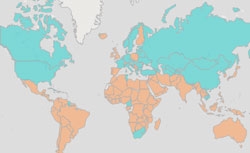Reproductive Rights Around the World
The complete global map of laws governing abortion and birth control.
On Wednesday, the highest court in El Salvador denied an abortion to a woman with a pregnancy that is so high-risk that doctors say it could kill her. Beatriz, 22, is carrying a 26-week fetus with anencephaly, a birth defect that means part of the brain and skull are missing and that the baby will almost certainly die at birth. Beatriz’s doctors say the abortion is necessary for Beatriz’s health and perhaps to save her life. But by a vote of 4–1, the Salvadoran judges ruled that in light of the country’s absolute ban on abortion, “the rights of the mother cannot be privileged over those” of the fetus.
El Salvador’s complete ban on abortions has become relatively rare worldwide, as the first map below shows. Keep scrolling and you will see enormous variation in how countries (and states in the U.S.) regulate abortion and birth control. Our main sources of data for these maps are the United Nations, the Guttmacher Institute, the Population Reference Bureau, the National Conference of State Legislatures, and Harvard University's Center for Population and Development Studies. (The maps on global contraception regulations largely reflect data drawn from a 2009 study conducted by researchers at Harvard University's Center for Population and Development Studies. Global contraceptive use statistics come from a 2008 survey by the Population Reference Bureau.)
The maps reflect continuing change: Uruguay recently legalized first-trimester abortions, and courts in Colombia, Brazil, and Argentina have begun to allow them in certain cases.* Meanwhile in the United States, Republican-led statehouses have been tightening restrictions since the 2010 election. It’s the largest wave of legislation in the decades since Roe v. Wade.
Abortion: Laws by country
Abortion: Exceptions by country
Contraception: Birth control pill laws by country
Contraception: IUD laws by country
Contraception: Condom laws by country
Abortion: Laws by state
Contraception: Contraception laws by state
Update, May 31, 2013: The first map has been changed to distinguish countries in which abortion is permitted for any reason, countries in which abortion is permitted for specified reasons, and countries in which abortion is never permitted.
Update, June 4, 2013: This page was updated with additional details on the source for the data on the map of contraception rights.
Corrections, May 31, 2013: In the interactive displaying abortion laws by country, a map originally claimed that the U.S. requires spousal consent in some states. While eight states do have spousal consent laws, they are not enforced because of the Supreme Court’s ruling in Planned Parenthood v. Casey. Additionally, some of maps of the U.S. originally suggested that some states require minors to have parental consent before accessing contraceptives. In fact, the laws for those states don't say whether minors can consent to contraceptives on their own or not. Maps regarding parental consent have been removed. This article also misspelled Colombia.
Correction June 3, 2013: The world maps in these interactives originally mislabeled Cameroon as Cape Verde and shaded Cameroon according to the data for Cape Verde.
